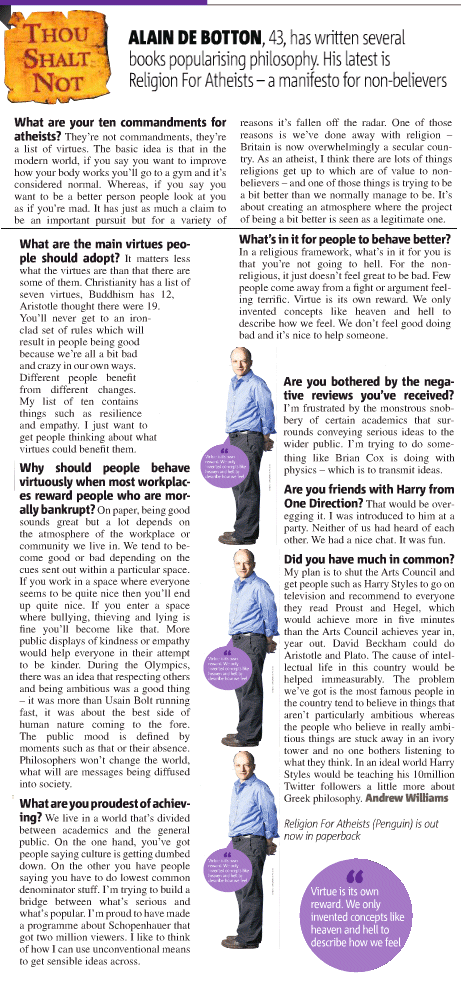
Philosopher
Who were they?
How can they help?






 |
Philosopher |
Who were they? |
How can they help? |
 |
Born 469 BC. Short, bald and
spectacularly ugly, Socrates wandered around Athens
barefoot,asking probing questions- notably forcing generals to
retreat on their definition of courage and making an aristocrat
acknowledge the bankruptcy of equating wealth with virtue. Accused
of undermining society, he was instructed to recant his teachings
or face death. Socrates calmly downed poisonous hemlock, but his
conversations and ideas were immortalised by his star pupil,
Plato. |
Believe in yourself Socrates
refused to be swayed by convention, popular opinion or even the
threat of death, and continued backing what he believed. Having
such self-belief does not mean you're right, but neither does
everyone else thinking you're off-beam make you wrong. No matter
how unpopular an idea is, if it cannot be logically disproved then
it is true.Not much consolation, though, if, like Socrates, you
end up right but dead. |
|
 |
Born 341 BC. A cool
head advocating hot hedonism, Epicurus taught that "Pleasure is
the beginning and goal of a happy life." Associates claimed that
this led him to such over indulgences that he vomited twice a day.
But friendship, freedom and plain food and water were what
Epicurus considered life's truest pleasures. In a precursor to The
Good Life, he and his friends quit the rat race of Athens to set
up a commune, growing their own food and bypassing the material
world outside. |
Get back to
basics De Botton gets an
unhappy shopaholic to apply Epicurus's principle of sifting what
is "natural and necessary" for happiness from what merely appears
to be. Wealth, fame, power and designer clothes may seem
appealing, but Epicurus argued that the only "happiness
essentials" besides basic food and shelter are friends, freedom
and an analysed life. Possess them and you will never be
unhappy....anything else is an optional extra. |
|
 |
Born 4 BC.
Tuberculosis almost killed him in his twenties; (false)
accusations of adultery later led to a long exile and the loss of
his wealth and status; and having survived tutoring the teenage
Nero, he was eventually condemned to death by his former pupil
after(again false) charges that he had plotted against the nutty
emperor. Even taking his own life went badly: he slit his wrists,
but they bled too slowly, swigged hemlock that had no effect, and
finally perished in the suffocating fumes of a vapour bath. |
Go with the flow Long-suffering
Seneca believed: "It better befits a man to laugh at life than
lament over it." He saw anger as the worst of vices, stemming from
a maladjusted sense of normality. Hold-ups, cock-ups and lost
socks are part of the natural (dis)order of things-and by grasping
this in Sunday's series opener, De Botton shows White Van Man how
to avoid becoming purple Face Man, and the rest of us how to cope
with whatever life hurls our way. Don't get mad, get reason. |
|
 |
Born AD 1533.
French nobleman who spent much of his life in his castle's
circular library and wrote unflinching essays about himself.
Included his sexual habits, bowel movements and farts, in order to
show the folly of analysing some aspects of our nature while
ignoring others. Or, as he bluntly put it, "Kings and philosophers
shit, and so do ladies." After travelling to Rome, Montaigne
cautioned against assuming one's own notions of normality are
superior to those of others. |
Be realistic
Rather than trumpet our nobility and powers of reasoning,
Montaigne maintained that if you take the whole human package -
our capacity for doubt, superstition, self delusion, arrogance
etc- it leads to one irresistible conclusion: "We are but
blockheads." Accept this, he argued, and stop measuring yourself
against loftily superhuman standards, and you will better
appreciate both your achievements and your failings. |
|
 |
Born AD 1788. German misery guts prone
to despair even before his father's apparent suicide. Inheriting a
fortune at 17, he chronicled "the misery of life". Shunned most
company besides poodles, arguing: "A genius can hardly be
sociable, for what dialogues could be so intelligent and
entertaining as his own monologues?" Somehow managed a ten-year,
on off relationship, but never wed, as "To marry means to do
everything possible to become an object of disgust to each other." |
It's not your fault De Botton
mischievously makes Schopenhauer his agony aunt, twisting his
gloomy ruminations into comfort for the lovelorn. Schopenhauer saw
attraction not as reflecting how suited people are for life
together, but as down to an unconscious sexual urge to produce
"balanced" offspring. So rejection is no indication that we are
flawed or unloveable, and attraction is no sign that a couple are
compatible. ..except as baby-makers. |
|
 |
Born AD 1844.
Walrus-moustached self-publicist who-only partly humorously-
labelled most philosophers "cabbage heads" and himself "the first
decent human being. Declared: "God is
dead", and speculated that around AD 2000 he would
fill the gap by being declared holy. Hasn't happened yet. His
ideas of a world of strong-willed "supermen" later proved popular
with Nazis, although during his lifetime Nietzsche made few
friends and had a breakdown 11 years before his death in 1900. |
No pain, no gain
Nietzsche wished for those he knew "suffering, desolation,
sickness, ill treatment, indignities". He saw such experiences as
character forming, insisting you cannot know real joy without also
knowing suffering. Having used this logic to console a bankrupt
businessman, De Botton admits that Nietzsche lambasted such "so
called consolations", arguing they are often "paid for with a
general and profound worsening of the complaint". |
|
|
 |
| Chaos | Quantum | Logic | Cosmos | Conscious | Belief | Elect. | Art | Chem. | Maths |